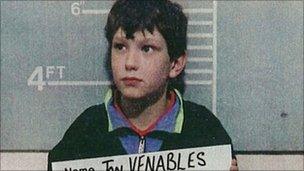Most child offenders should not face court, says report
- Published

Jon Venables, killer of toddler James Bulger, was tried in an adult court when he was 10 years old
The government is being urged to end Crown Court trials for children in England and Wales.
Two independent groups want most child suspects dealt with by restorative justice "conferences", where victims would help decide outcomes.
Even the most serious cases, such as murder, should be heard in a youth court rather than Crown Court, say the Police Foundation and Justice.
The government has its own less radical plans to use more restorative justice.
It is consulting about proposals to use it to deal with low-level crime , externaland anti-social behaviour.
Time and money
The Police Foundation and Justice report argues that most allegations involving 10 to 17-year-olds should be resolved in conferences involving the alleged offender, victim, family members, police and social workers.
The report suggests this approach should reduce reoffending, improve victims' confidence and save court time and custody costs.
It adds that restorative justice has been successfully introduced as a "key component" of the youth justice system in Northern Ireland.
The groups also say no child should face trial at Crown Court, which currently hear cases involving young people charged with "grave crimes" such as murder, firearms and sexual offences.
The report says the surroundings, procedures and language of the Crown Court are designed for adults.
The most serious cases should be heard in youth courts, which are less formal, in front of a reduced number of jurors, it is argued.
'Less intimidating'
The Ministry of Justice said Crown Courts already made attempts to "adapt" to the needs of young defendants.
"Children appearing in Crown Courts are not treated as adults and there are a range of measures available to help courts become more accessible," the ministry said in a statement.
"This includes allowing young victims and witnesses to give evidence from a separate room via video-link, judges and barristers removing their wigs to appear less intimidating and seating the judge on a lower level to be closer to young people's eye-line."
It said that restorative justice was "already widely used in the youth justice system".
Ten-year-old killers Jon Venables and Robert Thompson were tried in a Crown Court for the murder of toddler James Bulger in 1993, becoming the youngest people accused of murder in the 20th Century.
They were tried as adults and made to stand in the dock away from their parents, while the judges and barristers wore full gowns and wigs.
Some seven years later, the Court of Human Rights ruled that they should never have been tried in an adult court.
- Published10 December 2010
- Published7 December 2010
- Published13 September 2010